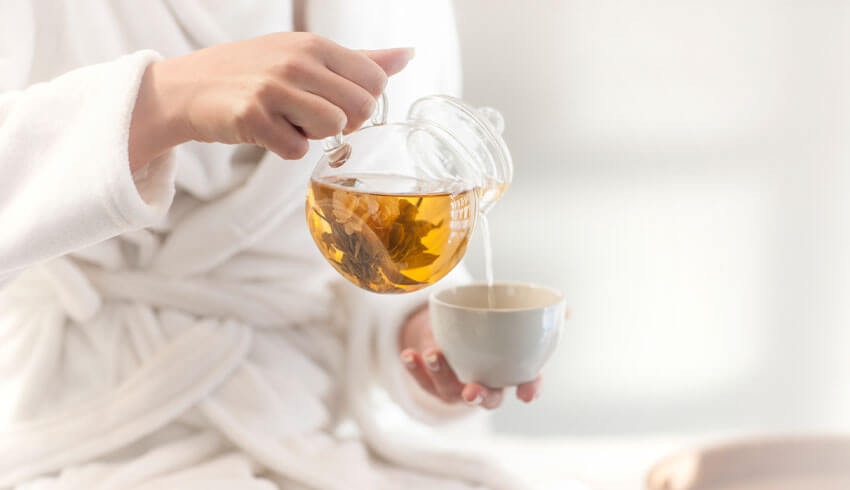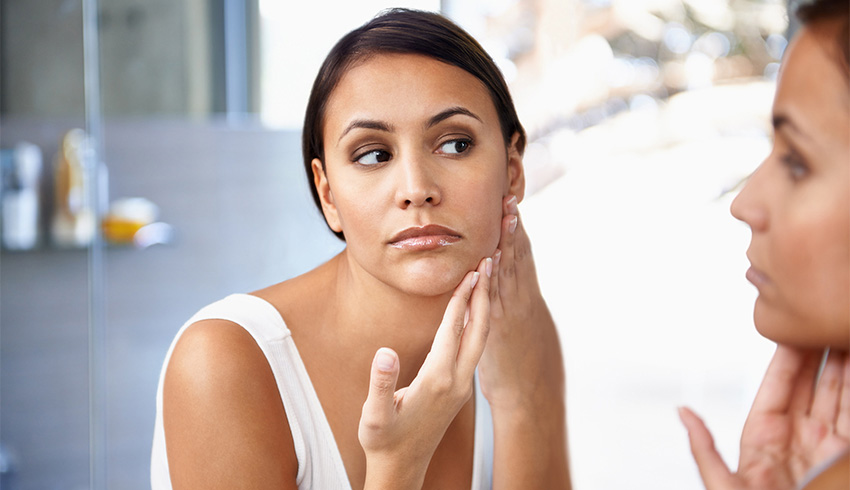
A cup of tea is a perfect pick-me-up in the afternoon but did you know it’s also a great pick-me-up for your skin? From fighting free radicals to reducing the appearance of fine lines and dissolving dead skin cells, tea has become a popular skin care ingredient. Read on to find out whether this ancient elixir is your skin’s cup of tea.
A Brief History of Tea
The story of tea begins in China in 2737 BCE. According to legend, Chinese emperor and renowned herbalist, Shen Nung, was sitting beneath a tree when some leaves from the tree blew into water that was being boiled for drinking. He decided to try the infusion that had accidentally been created. The tree was a Camellia sinensis, and the resulting drink was what we now call tea.
All traditional teas are still made from the leaves and buds of different varieties of the Camellia sinensis plant — originally from the borderlands of northern Burma and southwestern China. The difference between teas lies in how they are processed — whether they are fermented or not, for instance — and this determines their oxidation levels. Green teas are not oxidized at all, while black teas are very oxidized. In terms of beauty benefits, green tea and matcha are very poplular, but black tea, white tea and kombucha are also potent allies for your skin.
What Are the Benefits of Tea for Skin?
Tea has bioactives that have been scientifically proven to hydrate skin and protect it from aging and environmental harm. Antioxidant tea polysaccharides fight free radicals and absorb and retain moisture. Tea polyphenols protect skin by absorbing ultraviolet radiation and diverting it from doing epidermal damage. Polyphenols dive deep into the skin, putting up roadblocks around destructive enzymes that work against the skin’s “body-building” collagen and elastin. They protect your skin’s hydration by boosting hyaluronic acid and their anti-inflammatory activities improve microcirculation. So we've established that tea is your skin’s best friend, now we'll spill the tea on which blends will help you!
Green Tea
A perfect accompaniment to sushi, green tea is grown mostly in Japan. Green tea leaves are harvested, withered and steamed so that they stay green and unoxidized. There is an abundance of good things for the skin in this type of tea, especially EGCG, a polyphonic compound that is a powerhouse for the skin. It is known to have antioxidant, anti-inflammatory and anti-bacterial properties. It protects against the redness that UVB rays produce and is being studied for its role in healing wounds and lessening scarring. EGCG also has a remarkable ability to get inside the skin and stay there, mostly in the stratum corneum, where it actively moisturizes and smooths skin roughness and wrinkles.
Matcha Tea
Another Japanese export, matcha tea is green in color, but grown differently from regular green tea. About a month before harvesting, it is covered from direct sunlight to increase chlorophyll and amino acid levels. Intensely nourishing matcha tea powder is regenerative for tired, damaged skin that is low on oxygen. It also fights inflammation and protects skin from harmful free radicals.
White Tea
Young tea buds and leaves are harvested only once a year in early spring to make white teas like Bai Mu Dan (White Peony) and Yin Zhen Bai Hao (Silver Needle). The leaves and buds are minimally processed — not oxidized or rolled — which means that nothing has been bruised or twisted to damage cell walls and release the plant’s juices. As well as having strong anti-inflammatory and anti-bacterial properties, white tea extracts in skin care products are believed to boost hyaluronic acid action for a plumper, more hydrated-looking complexion.
Black Tea
Black tea, like pu’er from China’s Yunnan province, is the most oxidized of the teas because it is produced from leaves that are harvested, dried, rolled, ground and fermented. Black tea extracts are new to the skin care game and their tannins appear to protect skin from environmental damage as well as perform anti-bacterial, nourishing and hydrating functions. Other teas do that as well but black tea has one feature the others don’t: caffeine. Caffeine in skin creams stimulates microcirculation and helps reduce the look of puffiness under the eyes.
Kombucha
A by-product of black tea, kombucha is produced by fermenting black tea with sugar, yeast and bacteria. As a beverage, probiotic kombucha builds an ideal bacterial environment in the gut that aids digestion. And it can do something similar for your skin. According to dermatologist Dendy Engelman, MD, FACMS, FAAD, kombucha “… is excellent for balancing the skin’s microbiome by promoting a healthy ratio of good bacteria.” This is great if you are prone to acne or rosacea. Kombucha is also a natural exfoliant and antioxidant.
Darjeeling Tea
Often referred to as the “Champagne of teas,” true Darjeeling is grown exclusively in select tea plantations at the foothills of the Himalayas spread across the Darjeeling district of West Bengal, India. It is said that this tea grows at the highest elevation of all teas and that it is the altitude that creates an ideal environment for the tea plant, giving these teas a unique flavor and aroma. The natural antioxidant properties found in Darjeeling tea can promote healthy skin, while the polyphenols are known to combat inflammation.
Pineapple Tea
One more tea that is making its name in the beauty world is pineapple tea! It is made by boiling pineapple rinds, which extracts an enzyme called bromelain that is very helpful for digestion, but also has exfoliating properties for the skin — which makes pineapple tea a rising beauty star on TikTok. Bromelain dissolves the proteins that bind together dead skin cells with minimal irritation for clear, radiant skin. If you’re looking for the benefits of bromelain, our Pineapple Refining Tonique is where you’ll find them.
Tea for Different Skin Types
Dry Skin
Tea-infused products in your daily beauty routine can really up your skin’s game, and there seems to be a type of tea for every type of problem. Those with dry skin that is sensitive to pollution, cigarette smoke and the sun’s UVA and UVB rays should look to beauty products with extracts of hydrating green tea, white tea and oxygen-revitalizing matcha tea.
Oily Skin
Oily skin that is prone to acne will respond well to products with anti-bacterial and anti-inflammatory extracts of matcha, kombucha or white tea that detox the skin. Or try green tea, which is known to reduce the production of sebum.
Mature Skin
Mature skin can benefit most from how black tea can plump the look of skin and green tea retains moisture. White tea will also gently plump and reduce the appearance of fine lines. Any of these varieties will suit your skin to a "tea."
Tea Ritual
Rich in kombucha and white tea, nourishing Kombucha Microbiome Foaming Cleanser for the face primes your skin perfectly for our leave-on Kombucha Microbiome Balancing Essence and radiance-enhancing Kombucha Microbiome Luminosity Serum. High in polyphenol-rich green tea, the supremely hydrating Stone Crop Serum can be applied several times throughout the day to make skin look firmer and more protected. And finish off your daily shower or bath with green tea-infused Cranberry Pomegranate Sugar Scrub.
Are you looking to add the benefits of tea to your skin care routine? Visit your nearest Eminence Organics Spa Partner to find out how.





